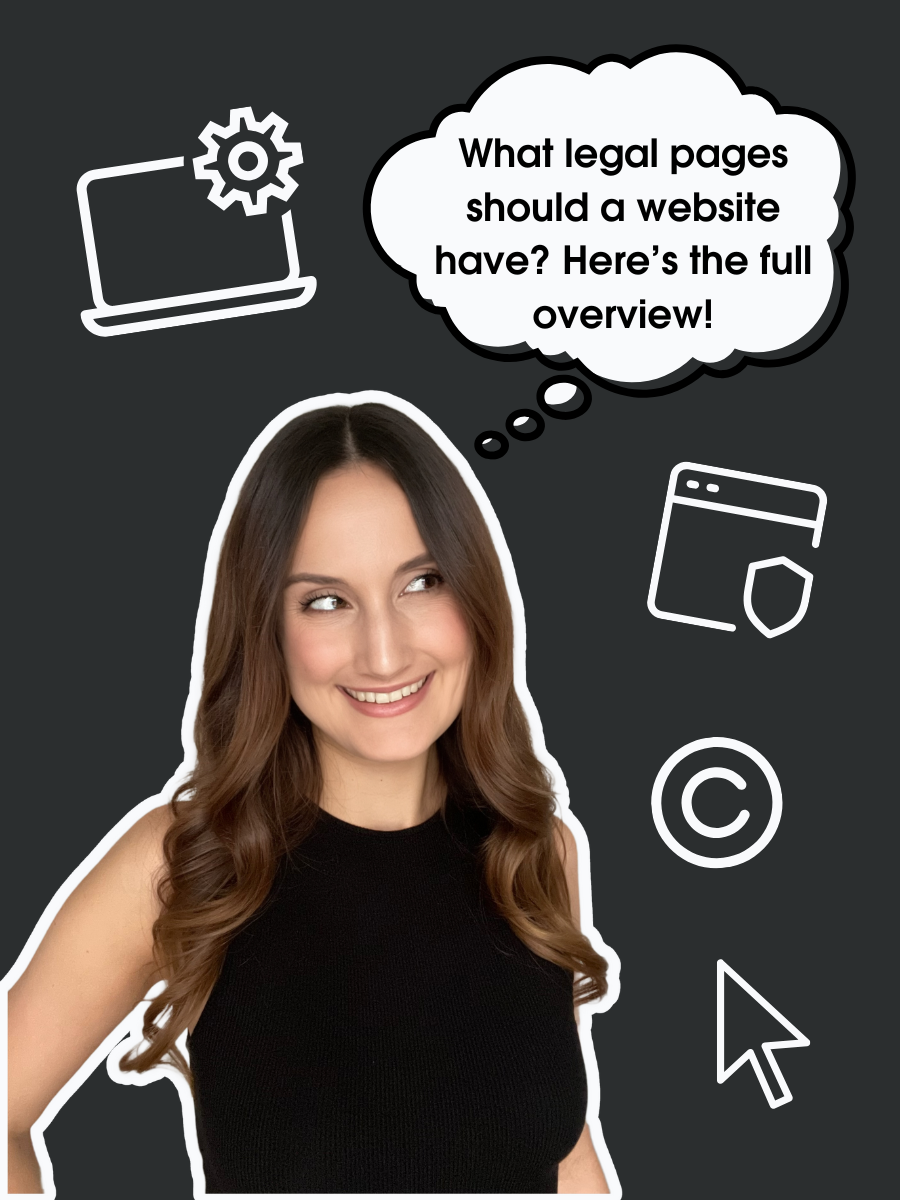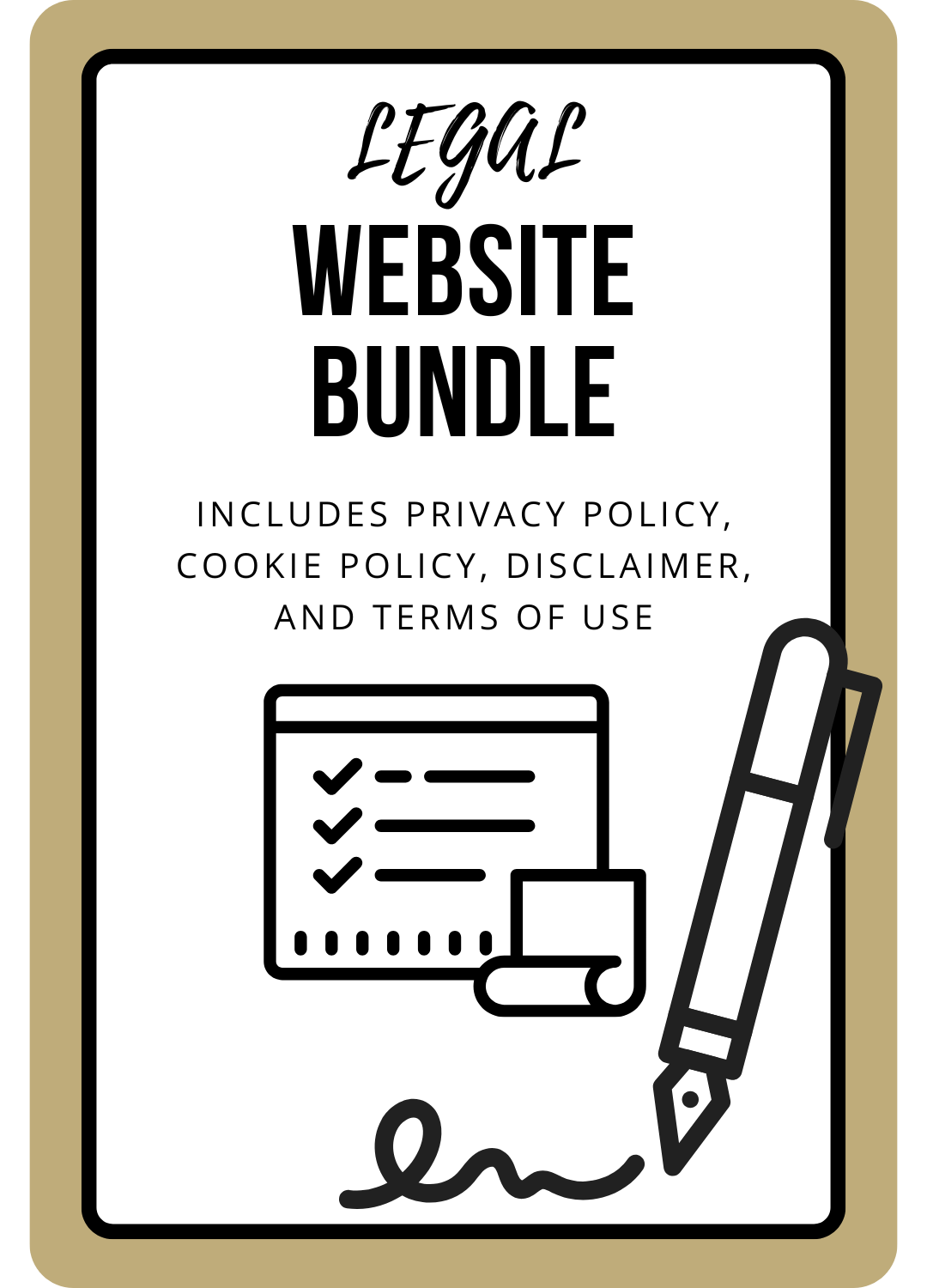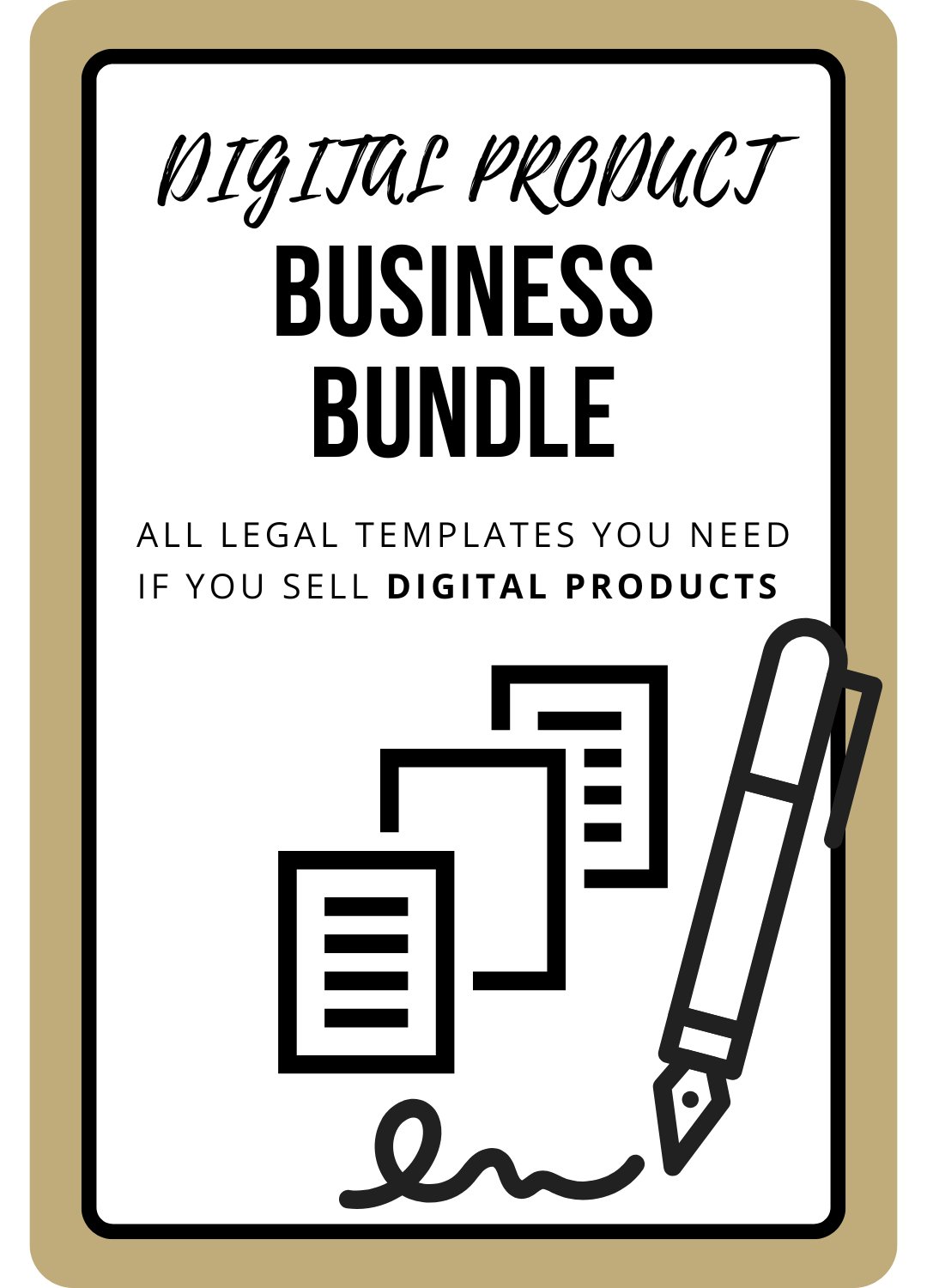What Legal Pages Should a Website Have? 7 Must-Haves to Protect Your Site, Brand & Sales
What legal pages should a website have to truly protect your business?
It’s a question every online entrepreneur, blogger, and creator needs to ask — because one missing page can expose you to fines, refund battles, or even content theft.
As a lawyer who drafts contracts and legal templates for business owners and creators worldwide, I’ve seen firsthand how quickly these problems arise when the right protections aren’t in place. The good news? With the right legal pages on your site, you can safeguard your brand, your content, and your income — without wasting hours trying to DIY them.
So, what legal pages should a website have in the US and the EU? In this guide, I’ll walk you through each legal page template you need when running a website in the US and the EU — and show you how to get them done in minutes instead of weeks.
After doing your own website legal check and learning all about the website legal requirements, you’ll know exactly how to become legally compliant and protect your content, brand, and digital products.
This post is all about answering the question: what legal pages should a website have to protect your site, brand, and sales?
What Legal Pages Should a Website Have: The Ultimate Guide
The Complete Website Legal Check: The 7 Legal Pages for Your Website
1. Privacy Policy for Legal Compliance
If your website collects any personal data — names, email addresses, IP addresses, or even analytics — privacy laws require you to have a clear privacy policy. These website legal requirements apply whether you run a full e-commerce site or just a simple landing page with an email sign-up form.
Without one, you could face hefty fines or legal complaints from visitors who don’t know how their data is being used. And yes — even a single landing page that collects emails for a freebie still needs a privacy policy.
A solid privacy policy explains:
What data you collect (names, emails, IPs, etc.)
Why you collect it (newsletters, analytics, personalized ads)
How it’s stored and protected
How visitors can access or delete their data
👉 Want this legal page template done for you? My Legal Website Bundle includes a ready-to-use Cookie & Privacy Policy template that’s drafted by a lawyer (me!) — so you don’t have to waste hours trying to figure it out yourself. This bundle includes all the basics you need, so you’ll never need to ask “what legal pages should a website have” again!
2. Cookie Policy (Even If You Think Your Site Doesn’t Use Cookies)
If your website uses cookies (and almost every site does), you’re legally required to tell visitors about it. Cookies don’t just track shopping carts or logins — they also collect personal data like IP addresses, location info, or browsing behavior.
That means even something as simple as Google Analytics counts as data collection under privacy laws. And if you’re running ads or retargeting campaigns, the rules for websites are even stricter.
Your cookie policy should explain:
What cookies you use (analytics, advertising, functionality)
Why you use them (to improve the site, run ads, personalize content)
How visitors can accept or reject cookies
Failing to disclose this properly can put you on the wrong side of GDPR, CCPA, and other privacy laws — leading to expensive penalties.
👉 Don’t stress about writing legal website pages from scratch. My Legal Website Bundle includes a Cookie & Privacy Policy template (plus all other essential pages), ensuring your website is compliant from day one.
Want to make sure you’re not missing any hidden requirements?
Cookies and privacy are just the start. Subscribe to my newsletter and get my free guide: 11 Essential Legal Elements for Your Website. Inside, you’ll find a full website requirements checklist — including how to create a copyright notice for your site, disclosures, and other easy-to-miss protections every site needs.
3. Website Terms of Use to Protect Against Content Theft
Unlike a privacy policy or cookie policy, there’s no law that says you must have terms of use. But here’s the truth: they’re often the most important legal page on your site — because instead of protecting your visitors, they protect you.
Your website terms of use set website terms of use requirements; rules for how people can (and cannot) interact with your site. Think of them as your house rules for the internet. Without them, you’re left vulnerable if someone misuses your content, posts harmful comments, or tries to hold you liable for mistakes on your site.
Strong terms of use should:
Protect your intellectual property (so visitors can’t copy-paste your content as their own)
Set clear boundaries (no spam, no harassment, no misuse of your platform)
Give you the right to remove users or comments at your discretion
Limit your liability for errors or outdated information on your site
Specify how disputes will be handled (so you’re not dragged into court anywhere in the world)
Example: Someone grabs your blog post, republishes it without credit, and claims it as their own. Or a visitor leaves defamatory comments on your site. Without terms of use, you have little ground to stand on.
👉 Never ask “what legal pages should a website have” again! My Legal Website Bundle includes a comprehensive Website Terms of Use template, drafted to protect your content, your reputation, and your business from unnecessary disputes.
4. Disclaimer Page to Portect Yourself Against Liability Risks
A disclaimer page is a legal page template that isn’t just “nice to have” — it’s your safety net against claims when people rely on your content. Whether you’re sharing tips, reviews, or even affiliate links, there’s always the risk that a visitor misuses your advice and then tries to blame you for the outcome.
Think about it:
You recommend a product, and someone claims it didn’t work or caused harm.
You share business tips, and a reader says they lost money following your advice.
You run a coaching blog, and someone argues you gave “medical” or “legal” guidance.
Without a disclaimer, you could be dragged into costly disputes or lawsuits over things you never intended to promise.
A strong disclaimer page should:
Clarify that your content is for informational/educational purposes only
Limit your liability for errors or omissions
Protect you when sharing affiliate products, recommendations, or advice
👉 My Legal Website Bundle includes a ready-to-use Disclaimer template — so you can confidently share content, knowing you’ve set the right boundaries from the start.
⚖️ Ready to Cover All Your Website Legal Pages?
Don’t waste hours trying to piece together legal language — I’ve already done it for you. With my contract bundles, you’ll have every essential page drafted by a lawyer and tailored for digital entrepreneurs.
Legal Website Bundle — includes Privacy Policy, Cookie Policy, Website Terms of Use, and Disclaimer.
Digital Product Business Bundle — everything in the Legal Website Bundle plus Terms & Conditions for Digital Products + Terms & Conditions for Online Courses.
Pro version of the Digital Product Business Bundle — everything in the standard bundle plus Affiliate Terms & Conditions + Testimonial Release Form.
👉 Choose the bundle that fits your business stage and protect your website, brand, and sales today.
Not ready to invest in templates yet? No problem.
You can still protect your site with my free website requirements checklist: 11 Essential Legal Elements for Your Website. It goes deeper into what your site needs — from sponsorship disclosures to newsletter consent rules to your copyright notice — so you can start locking down the basics today.
5. Terms & Conditions for Digital Products
If you sell digital products — like eBooks, templates, guides, or downloads — your Website Terms of Use aren’t enough. You need specific terms and conditions for digital products to protect your sales, your intellectual property, and your boundaries with customers.
Without the proper legal page template, here’s what can happen:
A customer buys your digital workbook, completes it, and then demands a refund — arguing it “didn’t work.”
Another uploads your eBook to a file-sharing site, and suddenly, hundreds of people are downloading it for free.
Or worse, someone tweaks your template slightly and starts reselling it as their own.
Your digital product terms should clearly state:
Payment and delivery (how buyers receive their product)
Refund policy (no refunds once the product is delivered)
Intellectual property rights (buyers only get a license, not ownership)
Usage limits (no sharing, redistributing, or reselling your files)
👉 Need this covered? You can grab my Terms and Conditions for Digital Products template as a standalone legal page template — or get the complete protection inside my Digital Product Business Bundle, which includes:
✅ The full Legal Website Bundle
✅ Terms and Conditions for Digital Products
✅ Terms and Conditions for Online Courses
That way, your website and your digital products are fully protected in one go.
6. Terms & Conditions for Online Courses
If you sell online courses, you need a separate set of terms and conditions that go beyond your website policies or even your digital product terms. Why? Because courses involve ongoing access, student behavior, and community rules — all areas that can get messy without clear boundaries.
Here’s what can go wrong without proper terms:
A student binge-watches your entire course and then demands a refund — claiming it “wasn’t what they expected.”
You offer a private Facebook group, but a student starts spamming or harassing others, and you have no clear right to remove them.
You advertise “lifetime access,” and months later, a student insists that means unlimited updates, new bonuses, and even future courses — without paying extra.
Strong course terms should cover:
Access rules (how long students keep access, what “lifetime” really means)
Refund policy (clear rules based on access, time, or progress)
Community guidelines (what behavior is allowed in groups or forums)
Intellectual property protections (students can’t copy or resell your course materials)
👉 You can get my Terms & Conditions for Online Courses template as a standalone — or save by grabbing the Digital Product Business Bundle, which includes:
✅ The full Legal Website Bundle
✅ Terms and Conditions for Digital Products
✅ Terms and Conditions for Online Courses
That way, both your website and your digital business are fully protected.
7. Affiliate Terms & Conditions
Running an affiliate program can be a powerful way to grow your sales — but without proper affiliate terms, it can quickly backfire. Affiliates are essentially representing your brand, and if you don’t set boundaries, you’re the one left responsible for their mistakes.
Here’s what can happen if you don’t have clear affiliate terms:
An affiliate makes false claims about your product in their promotions, and angry buyers come after you.
Someone uses your affiliate materials in spam emails, damaging your reputation.
An affiliate republishes your graphics or copy for their own products, blurring the lines of who owns what.
Your tracking system glitches and doesn’t log their sale — but without clear terms, they demand commission anyway.
Strong Affiliate Terms & Conditions protect you by:
Ensuring affiliates use only approved materials in the right way
Making clear that you own all intellectual property (they only get permission to promote, not to repurpose)
Setting rules on compliance with disclosure laws (so you’re not liable for their mistakes)
Limiting your liability if sales don’t track properly
👉 My Affiliate Terms & Conditions template is included in the Pro version of the Digital Product Business Bundle. With the Pro version, you get everything in the standard bundle plus:
✅ Affiliate Terms & Conditions template
That way, you’re not only protecting your website, digital products, and affiliates — you’re also covered for affiliate partnerships and client testimonials, two areas that can make or break your reputation.
Want to go deeper? Don’t leave without my free guide: 11 Essential Legal Elements for Your Website. It walks you step by step through copyright notices, affiliate disclosures, and a full checklist to make sure your site is legally covered.
Get Every Legal Page Template You Need Right Here!
Now, you have all the answers to the question “What legal pages should a website have?” — from privacy and cookie policies to disclaimers, terms for products and courses, and even affiliate rules. Each one plays a role in keeping your site compliant, protecting your content, and making sure your income stays secure.
But here’s the truth: most entrepreneurs don’t lose money because they don’t know these pages are important… they lose money because they put off getting them in place until it’s too late. One privacy complaint, refund dispute, or affiliate gone rogue can cost far more than a ready-to-use legal page template ever would.
👉 That’s why I created my contract bundles, so you don’t have to piece this together on your own:
Legal Website Bundle — covers the essential pages every website must have to comply with all website legal requirements and protect your content and business, including:
✅ Privacy Policy
✅ Cookie Policy
✅ Website Terms of Use
✅ Disclaimer
Digital Product Business Bundle — protects not just your website but also your digital product sales and online courses.
Digital Product Business Bundle – Pro Version — for creators ready to scale with affiliates and social proof.
✅ Everything in the standard bundle
With these bundles, you’ll have all the website legal pages you need in one place, written by a lawyer for digital entrepreneurs and creators like you.
➡️ Don’t wait until a fine, refund battle, or stolen content costs you — get protected today.
This post was all about what legal pages should a website have to protect online entrepreneurs, bloggers and creators.
Want more in-depth answers to the question “What legal pages should a website have?” or about the specific legal page template you need? Read these blog posts next:











